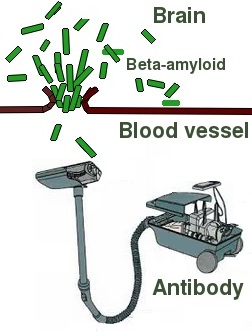 y now everybody knows that solanezumab, the antibody that drug giant Eli Lilly had
hoped would cure Alzheimer's disease, doesn't work. Like Pfizer's bapineuzumab and
Biogen's adacanumab before it, it has no effect on the progress of the disease. It's
bad news for Lilly, of course, but terrible news for patients.
y now everybody knows that solanezumab, the antibody that drug giant Eli Lilly had
hoped would cure Alzheimer's disease, doesn't work. Like Pfizer's bapineuzumab and
Biogen's adacanumab before it, it has no effect on the progress of the disease. It's
bad news for Lilly, of course, but terrible news for patients.
But for researchers it's almost a relief. We've been waiting for the results of these tests for years. Now we know for sure that immunotherapy does not work. Many scientists think we're too focused on the “bad protein“ theory of disease and are already searching for alternative theories.
But the beta-amyloid theory isn't dead yet. The new focus will be beta-secretase inhibitors. Beta-secretase is one of two enzymes in the brain that work together to create beta-amyloid, which is a small chunk of a much bigger protein called APP. (The other enzyme is gamma-secretase, which is a less promising target.)

Antibodies wait outside the brain in the bloodstream, waiting for beta-amyloid to come out, then suck it up like a vacuum cleaner. Because the blood-brain barrier blocks big molecules, typically only about 0.1% of a systemically administered antibody gets into the brain.
No one knows why beta-amyloid is being made or what its purpose might be. But we do know that plaques are not the problem. It's been known for a couple decades now that amyloid plaques don't correlate with cognitive impairment. The real hope for these antibodies was that they would eliminate the so-called beta-amyloid oligomers, which are tiny soluble clumps of beta-amyloid about the size of a regular protein. The oligomers can kill neurons; plaques don't.
Antibodies are generally far too big to actually get into the brain. They act like molecule-sized flypaper strips that float around in the blood waiting for beta-amyloid to leave the brain, then glom onto it. There are some obvious problems with this.
One is that the reason there's so much beta-amyloid in the brain might simply be that it can't get out. We know this happens in some familial types of Alzheimer's where the beta-amyloid is abnormal and tends to clump up more. It could be that clumps of beta-amyloid act like hair clogs in your bathtub, preventing all the other bad stuff from getting out. If so, antibodies wouldn't help much—they could even make things worse. If that's true, then what we really need is some kind of molecular Drano.
Even if we find some, it still might not work. One study found that in patients getting these antibodies that beta-amyloid actually increased in the brain. Sola patients had about four times more beta-amyloid on average than the placebos who also had Alzheimer's but did not get antibody. One Bapi patient had 80 times more beta-amyloid in one brain region than the placebos.
This study needs to be repeated, and sadly we will have the chance to do so. But what it suggests is that, at least in these patients, the brain seems to be frantically manufacturing beta-amyloid. The question is: why?
Another problem is this: what if the clog isn't in the blood vessels, but in the pores leading to the cerebrospinal fluid, the perivascular space, or the glymphatic system, which is where metabolic waste products in the brain are flushed? The cells that make up this glymphatic system are called glial cells and they're known to play an important role in getting rid of beta-amyloid.
Drug companies now plan to go after beta and gamma secretase, trying to stop beta-amyloid from being formed. It won't be easy. Gamma secretase acts on lots of other proteins besides APP, and blocking it has bad effects on the entire brain. Making inhibitors of beta-secretase has been tough. Getting them across the blood-brain barrier may be even tougher.
There's also an enzyme called alpha-secretase, which prevents beta-amyloid from being formed at all. Unfortunately some studies have shown that activating alpha-secretase can promote cancer. So the patient would go from the frying pan into the fire.
If it turns out that beta-amyloid is just a symptom, not a cause, none of these strategies will work. If beta-amyloid is part of the brain's protective mechanism, getting rid of it will only make the disease worse. What we really need is a better theory.
Last updated Jan 05 2017

